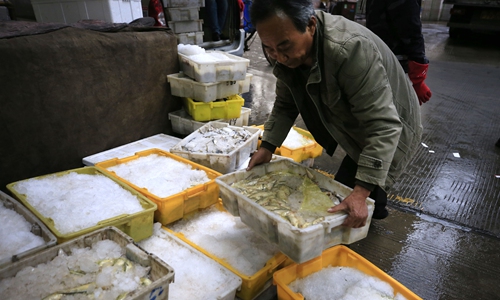Shenzhen carries out large-scale disinfection on imported frozen foods as COVID-19 concerns grow
Source: Global Times Published: 2020/8/18 10:30:49

A vendor transfers a box of seafood at a market in Shanghai on Saturday. Photo: Yang Hui/GT
Shenzhen, South China's Guangdong Province, will set up an 80,000-ton warehouse specifically for supervising imported frozen food products starting from Tuesday. Concerns have been growing that cold-chain supplies can carry the coronavirus since a batch of imported frozen chicken wings from Brazil tested positive for COVID-19.
Before being stored, sold or processed in the city, all of the imported frozen food products arriving in Shenzhen must undergo a disinfection process, with samples taken for nucleic acid testing, according to an announcement on the local market regulator's WeChat public account.
It outlined a new rule that the products' owners need to register a number of details before being able to take their products out of the warehouse, including a customs declaration, details of the drivers transporting the products and where the products plan to be sent. Once the paperwork has been completed and the products disinfected, tested for COVID-19 and issued a certificate, they can be shipped.
The regulator stressed that imported frozen food products can't be stored, sold or processed in Shenzhen without the certificate.
It said the government will help assist in covering the fees for the procedures and their storage in the warehouse.
A worker at the warehouse surnamed Liu told the Global Times on Tuesday that it's estimated that it would take around two hours to disinfect each container, and three to six hours to get nucleic acid testing results.
"We'll be writing down how much time each procedure requires and will try to shorten that in the coming days," Liu said, noting that the 80,000-ton warehouse, comprised of several floors, is large enough to process huge amounts of product each day.
The move came after a rise in coronavirus cases related to imported frozen food. Shenzhen detected novel coronavirus on frozen chicken wings imported from Brazil on August 11. In addition, the outbreaks in Beijing's Xinfadi market and a seafood company in Dalian, Northeast China's Liaoning Province, were also linked to frozen food products.
On Sunday, the Guangzhou Cold Chain Industry Association called for the suspension of imports of frozen meat and aquatic products from COVID-19 stricken countries and regions, and also required all employees that came into contact with the contaminated products to undergo weekly nucleic acid tests.
Global Times
Posted in: INDUSTRIES